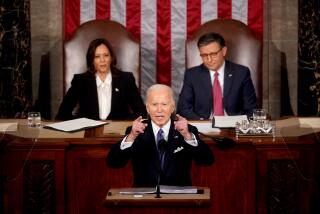McManus: Obama’s new tone
- Share via
We already know the outlines of what President Obama plans to say in his long-awaited jobs speech before Congress on Thursday night. He will propose a list of job-creation measures — tax cuts, infrastructure spending, aid to state governments, training for the unemployed — that will probably add up to about $300 billion worth of economic stimulus.
Obama is unlikely to use the now-discredited word “stimulus,” of course; instead, he’ll cast his proposals as “job creation.” Even so, Republicans in Congress are unlikely to embrace most of them.
The real aim of the president’s speech is to reframe our national debate over economic policy, moving it to more favorable ground than Obama has encountered over the last year or so. His success or failure could determine whether he gets a second term.
In 2009, in the depths of the financial collapse, Obama persuaded a Democratic-controlled Congress to pass a $787-billion stimulus plan the administration said would both spur the economy and hold unemployment to 8%. When unemployment soared above 9%, Republicans pronounced the spending a colossal failure.
Many economists insist the stimulus failed because it was too small and too diffuse. But for most of 2011, the debate has focused on deficit cutting and debt reduction, the core of the Republican message. Obama has found himself fighting on Republican ground.
Polls suggest that both sides “lost” in this summer’s battles over debt reduction; public confidence in Congress fell far lower than confidence in Obama.
But when Obama runs for reelection next year, he won’t be running against Congress; it’s likely he’ll be running against a governor or an ex-governor who will make it clear that the mess in Washington wasn’t his doing.
Obama’s Republican opponents have honed their message to a simple, endlessly repeated assertion: Federal spending and regulations are killing the economy. Obama has tried to turn the economy around with increased spending, but that failed.
For months, Obama has found himself in the position of responding with “yes, buts.” Yes, federal spending needs to come down, but not yet; yes, some regulations are bad, but not all regulations. His positions are sensible, but complex; the Republican message — hammering on the president’s failings — is much simpler.
The biggest surprise of Obama’s presidency, especially after his brilliant 2008 campaign, has been what a poor politician he turned out to be once in office, especially after the wind turned against him. Perhaps his biggest shortcoming has been his failure to sell his achievements. He gave most voters a massive tax cut, but then neglected to tout it, leaving many recipients unaware they’d gotten it. His healthcare law included something most voters wanted — access to insurance for people with preexisting conditions — but he didn’t highlight the change.
Now Obama hopes to turn a corner with a new tone — and, it appears, a new strategy. His rhetoric over the last few days has turned sharper and more partisan. He sounds as if he has taken at least some of the advice of liberal Democrats who have been pleading with him to stop seeking compromise with the GOP and to draw bright lines instead.
The administration’s aim is to force Republicans to either embrace his proposals or reject ideas most Americans are likely to support, such as an extension of the payroll tax cut, tax breaks for employers who create new jobs and a public-private “infrastructure bank” that has the backing of the largely Republican Chamber of Commerce as well as the AFL-CIO.
Obama gave a preview of his new tone on Labor Day, when he delivered a surprisingly partisan and aggressive speech to union members in Detroit.
“We’re going to see if congressional Republicans will put country before party,” he said. “You say you’re the party of tax cuts? Well then, prove you’ll fight just as hard for tax cuts for middle-class families as you do for oil companies and the most affluent Americans. Show us what you got.”
Instead of trying to defend his own record, he’s trying to put Republicans on the defensive.
And there are signs that Obama’s aggressive stance has gotten their attention: House Speaker John A. Boehner (R-Ohio) and Majority Leader Eric Cantor (R-Va.) sent the White House a letter this week asking to meet with the president before his speech — to explore issues on which bipartisan cooperation might work. Obama declined.
Republicans are complaining that Thursday’s speech is the first big event of Obama’s 2012 reelection campaign. They’re right. And after his address to Congress, Obama plans to take his new pitch around the country, beginning with a speech Friday in Richmond, Va., Cantor’s hometown.
The president is banking on the premise that Republicans in Congress have overstepped whatever mandate they won in 2010. The reaction to Thursday’s speech may provide the first indication whether he’s right.
More to Read
A cure for the common opinion
Get thought-provoking perspectives with our weekly newsletter.
You may occasionally receive promotional content from the Los Angeles Times.










